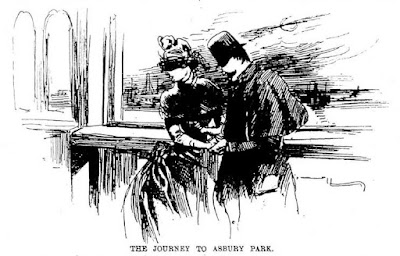“No more happy and loving couple could be found,” said Harry’s father, Col. John B. Schoonmaker, “So far as I knew, they never had a quarrel, and all was love and happiness.”
But in December 1888, Harry began acting strangely. His parents noticed he was irritable, and his talk was flighty. Others said he was “…alternately excited and depressed as if he was addicted to the use of opium or some other drug.”
On December 24, his family received a telegram from Harry:
Mama and Henry, Come down as soon as possible. If you find doors locked, force the front parlor door. Harry
Disabled with rheumatism, Col. Schoonmaker was unable to go, so he sent his wife and her brother, Henry Van Winkle, to Harry and Edith’s flat. They found the young couple lying in bed, tightly clasped in each other’s arms and covered with blood. Edith had two gunshot wounds to the head and one to the abdomen. Harry was dead with a bullet in his temple. Edith, unconscious but still alive, was taken to the Long Island College Hospital.
Within a day, the image of the happy, loving marriage began to tarnish. Harry was deeply in debt and constantly worrying about finances. Edith was often jealous of her athletic young husband. The previous week, they took a weekend off without the baby and stayed at Romain’s Commercial Hotel in Asbury Park, New Jersey. Other guests at the hotel overheard their loud arguments.
After supper one night, Harry put on his hat and coat to go out.
“Stay with me,” his wife was heard to ask.
“Can’t do it, my pet,” he answered.
He went out, and when he returned, he went to the billiard room for several hours rather than returning to his wife. She stayed up waiting for him and was overheard reproaching him when he came in. After breakfast the next morning, the proprietor overheard another loud altercation.
At one point, she screamed, “Don’t, Harry; for God’s sake, don’t.”
The animosity continued when they returned home, climaxing on December 24. It was clearly a case of murder and suicide, but because the couple was found in a loving embrace, some believed it was a suicide pact, and they had decided to leave the world together. Most, however, agreed with Police Capt. Campbell, who was convinced that Harry did the deed while insane, without her knowledge.
Edith Schoonmaker was only semi-conscious at the hospital, so Mamie told her story to Edith’s sister. She said that she accompanied Harry to Asbury Park. Though he registered as Mr. Schoonmaker and wife, Mamie was the woman with him.
“We went at once to our room.” She said, “What ensued is too terrible to tell. I resisted the best I could, whereupon he produced a pistol and said that he had about made up his mind to kill the both of us.
“‘For God’s sake, don’t, Harry.’ I screamed.
“Then he laughed, and while he kept me closely embraced, he removed two cartridges from the revolver right in front of my face and said:
“‘One of them is for you. The other for me.’
“After that, I let him do as he pleased. I became as cheerful as possible so as to divert his mind from the subject of murder, but during that entire night, I suffered horror untold.”
Harry would not let her leave the room the following day because he feared someone would see he was not with his wife. That night was a repetition of the one before.
On the way back to Brooklyn, he constantly talked about committing suicide. He told her he was burdened with debt and saw no hope of pulling out.
“Whatever my fate may be,” he concluded, “I want you to meet the same.”
They corresponded by mail, and Harry asked her to meet him on Monday on the Brooklyn Bridge. While waiting for him on the bridge, Mamie learned of the murder and suicide.
Edith Schoonmaker died on December 26. Mamie Wood disappeared, leaving everything behind except some jewelry Harry had given her. Her relatives feared she had committed suicide.
Mamie arrived in Newburg on December 27. She had taken a steamer and, during the voyage, suffered from convulsions. Mamie admitted she had taken arsenic. But when diagnosed, physicians determined she suffered from hysteria due to nervous exhaustion. She thought she had purchased rat poison at a Brooklyn drugstore, but the druggist suspected her suicidal intentions and substituted Fuller’s earth, a non-toxic substance, for the rat poison.
When the Newburg Police took charge of her, Mamie was holding a packet of letters, including one addressed to her mother. She intended it as her suicide note, and in the letter she said:
“I am not crazy, neither was poor Harry. Tonight, one week ago, I laid eyes on him for the last time. I made a promise to him, for you do not know the harm done me. Still I love him dead as alive. He asked me to share his fate, which I wish had been done to me at the same time as he, and spared his suffering wife.”
Sources:
“Gay Young Schoonmaker,” Sun., December 27, 1888.
“Has She Killed Herself,” Evening world., December 27, 1888.
“His Folly,” National Police Gazette, January 12, 1889, 7.
“Mamie Wood Still Alive,” Evening capital., December 29, 1888.
“Mamie Wood Takes Rat Poison,” Sun., December 28, 1888.
“Mamie Wood's Secret,” New York Herald, December 29, 1888.
“The Schoonmaker Tragedy,” evening world., December 25, 1888.
“Shocking Tragedies,” Boston Daily Journal, December 24, 1888.
“Shot His Wife And Himself A Suicide And Probable Murder,” New-York Tribune., December 24, 1888.
“Solv ed,” evening world., December 26, 1888.
“Young Schoonmaker's Crime,” New-York Tribune., December 25, 1888.









.jpg)











0 comments :
Post a Comment